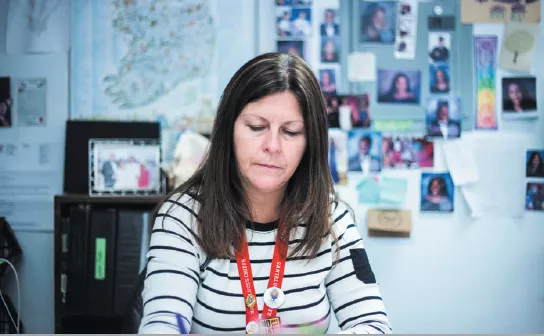"Be mean. Don’t smile. Be firm." This is the advice Dorothy Schroader got—and took—when she was a new middle-school teacher in the late 90s. But it is not who she is today. Things happened, some really terrible things, that upended the way she thinks about her work. Now, she nurtures her students and inspires her colleagues, and recently she won a prestigious South Florida teaching award.
In the early days, “I was good at being mean,” she says. “The kids sat down. They did their work. And they hated my class, but I didn’t care because I was following the curricu-lum.” She recalls harassing a sixth grader, Jordan, who never came prepared to class. “Where’s your stuff ? Where’s your pencil? You had it yesterday, where is it today?”
When Schroader finally went to a counselor, she learned Jordan lived in a van with his father while his mother was jailed for prostitution. Ashamed by her lack of compassion, “I thought, ‘I will never be that teacher again,’” she says.
The following year, Schroader’s good friend down the hall, a teacher named Barry Grunow, was killed by a 13-year-old who had been sent home earlier for misbehavior and returned with a gun. It was the last day of school—May 26, 2000—and the last time Schroader had any interest in standardized test scores or curriculum pacing guides. In her Dwyer Award application, Schroader wrote, “This day marked an enormous change in me as a human being as well as a major change in my teaching philosophy...my focus shifted to knowing my students academically as well as personally, promoting acceptance and diversity...”
Now a teacher at Santaluces High School in Lantana, Fla., where about 73 percent of students live in poverty, Schroader opens class with writing prompts (see sidebar) that “give [students] the sense they are not alone,” she says. Generous with high-fi ves and hugs, she runs “Open Mic Fridays” for young poets and musicians, a thoughtful—and winning—debate team, and Peace Club. “If you need some empathy, or if you have empathy to give somebody else, come to Peace Club!” It’s all about relationships, she says.
She makes it clear to students that they matter to her. Twice, students thinking about suicide have come to her for help. Schroader connected them to mental health services and helped save their lives. “Kids need to have somebody, and sometimes I will put my academic curriculum on hold to have a discussion,” she says. “People on campus know—
I will talk to you.”
And they never need to worry about pencils. Schroader has a box on a shelf, alongside a pile of snacks, and tells her students they don’t need to ask. Just take one.
Try Schroader’s writing prompts in your classroom:
1. Choose a color that describes how you feel today, and explain why this color is the best explanation of the feeling. Find someone who chose the same color, and compare and contrast your reasons.
2. “We can shoot rockets into space, but we can’t cure anger or discontent.” - John Steinbeck. Which do you feel Americans should invest more in: space travel or mental health? Explain your choice. (This topic can grow into a debate, philosophical chair, or Socratic seminar.)
3. Create a playlist of your life with three to five songs. You can showcase one “chapter” of your life or your whole life. Explain what each song means to you. Over the next few weeks, we will listen to a song from every student. You will identify a classmate you connect to because of the music and explain why.
4. “It’s not the strongest of the species that survive, nor the most intelligent, but the one most responsive to change.” - Charles Darwin. Explain what this quote is trying to say. Do you agree or disagree? Why?

